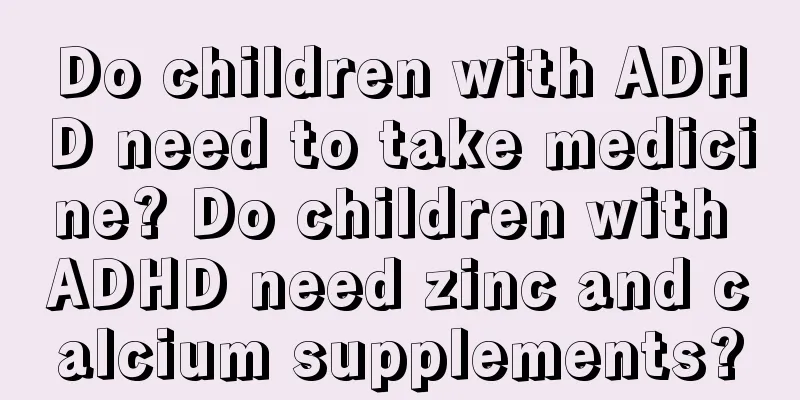What should parents do if their child has appendicitis?

|
Appendicitis is the most common emergency in children's abdominal surgery. Early detection and treatment are very important. So what causes children to get appendicitis? What should you do if your child has appendicitis? How can you prevent your child from getting appendicitis? The following editor will give you a detailed introduction. Causes of appendicitis in childrenThe appendix is a long and thin tube that is connected to the cecum at only one end. Once blocked, secretions may accumulate in the lumen, increasing the internal pressure and compressing the appendix wall to block distal blood supply. On this basis, bacteria in the lumen may invade the damaged mucosa, causing infection.There are also cases where the disease occurs without obstruction. The main factor is direct infection caused by bacteria in the appendix cavity. Because the appendix cavity is connected to the cecum, it has the same species and number of bacteria as the cecum cavity, mainly Escherichia coli and anaerobic bacteria. If the appendix mucosa is slightly damaged, bacteria invade the wall of the tube and cause varying degrees of infection. A small number of patients develop after upper respiratory tract infection, so it is also believed that the infection can be transmitted to the appendix through the blood. Another part of the infection starts from purulent infection of adjacent organs and invades the appendix.Other factors believed to be related to the onset of the disease include visceral nerve reflexes caused by gastrointestinal dysfunction (diarrhea, constipation, etc.), which lead to spasms of the appendix muscles and blood vessels. Once the normal intensity is exceeded, the appendix lumen stenosis, blood supply obstruction, mucosal damage, bacterial invasion and acute inflammation may occur. In addition, some people believe that the onset of acute appendicitis is related to dietary habits and genetics. The incidence rate is low in areas with a high-fiber diet, which may be related to faster colon emptying and less constipation. The habitual use of laxatives due to constipation may cause congestion of the intestinal mucosa and may also affect the appendix. Some people believe that genetic factors are related to congenital malformations of the appendix. Excessive twisting, small lumen, excessive length, and poor blood supply are all conditions that are prone to acute inflammation.What to do if your child has appendicitisFor acute appendicitis caused by suppuration, gangrene, ascaris and foreign bodies, surgical treatment should be performed as soon as possible once the diagnosis is confirmed;If the child has a long course of illness, after conservative treatment, the appendix inflammation is controlled locally, forming a mass, and B-ultrasound examination confirms that there is pus in the mass, then puncture and aspiration of pus or surgery can be performed under the guidance of B-ultrasound to cut open the appendix abscess and drain the pus out;If the condition of children who have not been fully diagnosed does not improve or worsens after 6 to 12 hours of conservative treatment, surgical treatment should be performed immediately;Children with symptoms of peritonitis and appendicitis perforation should undergo surgery immediately to remove the appendix and place drainage in the abdominal cavity. After the surgery, they should be treated with antibiotics or Chinese medicine under the guidance of a doctor;Children with chronic appendicitis should undergo surgery immediately when they have an acute attack. Especially children with long-term recurrent abdominal pain, who have chronic inflammation in the appendix cavity and whose normal life is affected, should undergo surgery as soon as possible to remove the appendix.How to prevent appendicitis in childrenDiet: Guide children to develop good eating habits, pay attention to food hygiene, wash hands before meals and after defecation, and avoid overeating.Activities: Do not eat while playing, and avoid strenuous exercise such as running, jumping, and hopping right after a meal.Deworming: To prevent intestinal parasites, follow the doctor's advice and receive deworming treatment promptly.Exercise: Strengthening children's physical fitness, increasing exercise, and preventing the occurrence of various diseases, such as actively preventing upper respiratory tract infections, measles, acute tonsillitis, etc., are all of positive significance. |
<<: Can I eat pecans after a miscarriage? What is the best thing to eat after a miscarriage?
>>: What can you eat after childbirth to fight against aging? Postpartum anti-aging diet
Recommend
Can pregnancy test sticks go wrong? The chance is relatively small
Many people think that pregnancy test sticks are ...
Can fruit puree be heated? How long can fruit puree be kept after opening?
Fruit puree is a very common baby food on the mar...
How to remove melanin during pregnancy and the cause of melanin formation
During pregnancy, some pregnant mothers' skin...
Can children eat ice cream when they have a fever? Can children eat ice cream when they have a cold and fever?
The child has a fever and the medicine is bitter....
How to judge whether the baby can continue to go to school when he is sick
It is inevitable that children will get sick duri...
How to prevent children from falling and getting injured most effectively
Children are fragile and need to be especially ca...
Talking about aesthetic education: understanding art from graffiti
In our understanding, aesthetic education should ...
What should pregnant women do if they don’t like to drink water? The consequences of pregnant women not liking to drink water
Drinking water is something we all do every day. ...
What is the correct sleeping posture for a newborn baby? How can a newborn baby sleep with a good-looking head shape?
The sleeping posture of newborns has a certain im...
Which country's brand is Safeguard soap from? Can Safeguard soap be used to wash hair?
Safeguard soap is a common toiletries product in ...
What should I do if I lose a lot of hair after giving birth? What should I eat to prevent hair loss after giving birth?
After giving birth, mothers will find that their ...
What nursery rhymes can help babies learn to speak?
It is a headache for babies to learn to speak. Us...
What are the reasons for baby spitting up milk? How to deal with baby spitting up milk
I just finished feeding my baby, and not long aft...
How to treat and prevent white pupils in children's eyes
Ophthalmologists warn that severe retinoblastoma ...
How to train your baby to fall asleep on his own? How to train your baby to sleep through the night?
The baby's sleep problems will determine the ...









